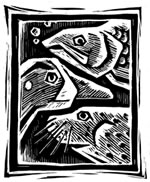- Home
- Restoration Projects
- Project Search
- Assessment of Prince William Sound walleye pollock with investigations into walleye pollock-Pacific herring interactions 22220203
Project Information
Title: Assessment of Prince William Sound walleye pollock with investigations into walleye pollock-Pacific herring interactions 22220203
Project Year and Number: 2022: 22220203
Other Fiscal Years and Numbers for this Project: None
Principal Investigator (PI): David Beauchamp (USGS), Mike Byerly (Alaska Department of Fish & Game), Paul Hershberger (USGS), Pete Rand (Prince William Sound Science Center), Wyatt Rhea-Fournier (Alaska Department of Fish & Game), Andrew Whitehead (University of California Davis)
Managing Agency: ADFG
Assisting Personnel: None
Research Location: Prince William Sound
Restoration Category: Monitoring
Injured Resources Addressed: Pacific Herring
Abstract:This project will conduct research and monitoring activities to assess the pollock population in Prince William Sound (PWS) and investigate ecological interactions between pollock and herring. Available evidence suggests the population of pollock in PWS increased in the early and mid-1990s when the PWS herring population began to decline. Researchers have hypothesized pollock in PWS are limiting the recovery of herring due to their high abundance and the potential for mortality of herring from direct interactions. Although PWS pollock abundance estimates were generated in the past and interactions of herring and pollock have been reported previously, this proposed comprehensive project will gather new information and analyze data since the Exxon Valdez Oil Spill (EVOS) and since the recent Gulf of Alaska marine heatwave. Winter research surveys will quantify the PWS pollock spawning stock biomass and age structure and summer monitoring surveys will reestablish a 26-year index of abundance for pollock. This project will provide new information to assess herring mortality from interactions with pollock that have not been previously investigated or quantified, including the transmission of pathogens and predation. The winter survey will collect pollock eggs to assess the prevalence of a primary pathogen of herring, Ichthyophonus, and to investigate the transmission and ecological cycling of the pathogen. The summer survey will collect stomach contents of pollock and other dominant groundfish to identify previously undocumented herring predators. Pollock and other groundfish will have herring specific consumption rates quantified which will allow the significance of herring removals through PWS groundfish predation to be evaluated for the first time. The two surveys for this project will directly inform the management of the state-waters pollock fishery and the larger federal fishery and enable the continuation of the only long-term benthic community research survey time-series providing community composition observations in the EVOS affected area.
This project was approved for the FY22 - FY26 funding cycle.
In FY23, ADF&G decided to terminate the ADF&G component of this project. This project is unable to move forward due to the R/V Pandalus being decommissioned. Other alternatives to conduct the bottom trawl surveys were pursued, including retrofitting the existing ADF&G vessel R/V Solstice and chartering a vessel, but both options were cost prohibitive. Please see the Notice of Termination below.
Projects 23160111-F and 23120111-E will continue the ovivory work from this project in FY24 and FY25 to determine if the parasite Ichthyophonus is transferred to herring through the consumption of pollock eggs.
Proposal: View (1,178 KB)
Information and/or Products produced by this project:| Title | Description | Type | Document(s) |
|---|---|---|---|
| ADF&G Notice of Termination | Other |
View (224 KB) |
Reports:
FY22 Annual Report: View (258 KB)
Final Report: File Unavailable
Publications from this Project: None Available
Resolutions: